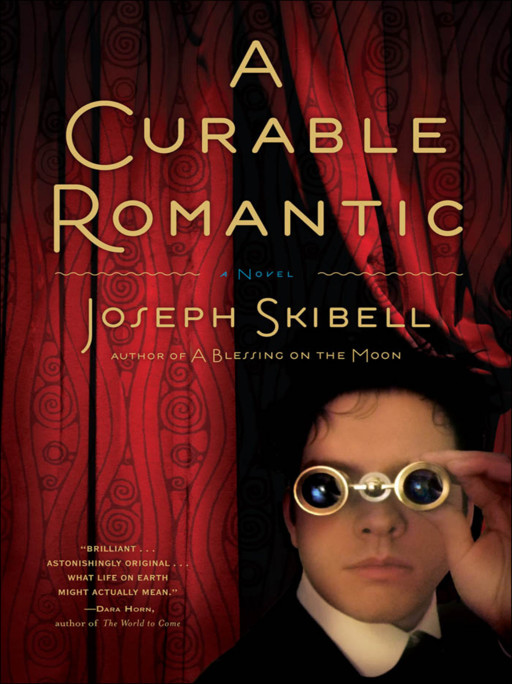A Curable Romantic (105 page)
Read A Curable Romantic Online
Authors: Joseph Skibell
Tags: #Literature & Fiction, #Genre Fiction, #Historical, #Jewish, #Literary, #World Literature, #Historical Fiction, #Literary Fiction

 nodded. “She would do what Heaven wished — ”
nodded. “She would do what Heaven wished — ”
“Esperanto, the Messiah, et cetera.”
“ — if we’d see to it that you were protected throughout these dark days.”
“They’ve kept their parts of the bargain,” the rebbe said. “Now you must keep yours.”
It was all a bit confusing, I have to say.
“Ita bargained with the Heavenly Court on my behalf, ransoming me like a captive?”
“She loved you, you see,” said.
said.
What was there to say to that? Nothing, and so we all stood for a moment in silence, until coughed conspicuously, as though to remind us that time was short and there was something that still needed doing.
coughed conspicuously, as though to remind us that time was short and there was something that still needed doing.
“Oh! Oh, yes,” the rebbe said. “Yes, there
is
something more.” He bent to the ground and dug through the snow. He lifted his mud-encrusted index finger towards my forehead. “Allow me just to write a little something across your brow, if I may.”
Before I could protest, his finger was moving across my forehead, and when he was done, he quickly brushed off whatever he had written there.
“And what was that?” I said.
“Oh, never you mind about that,” he answered sternly.
But said, “It’s the name of your beloved, of course.”
said, “It’s the name of your beloved, of course.”
 said, reading.
said, reading.
“The bride your father chose for you. After all, you’re leaving here under her protection.”
“Speak to no one,” the rebbe said, holding me firmly by the shoulders. “Look no one in the eye until you’re safely away. Do you understand me?”
“Not really.”
“Well, just do what you’re told, then, for once in your life.”
We kissed each other, and he handed me a satchel filled with food and water. Taking off his coat and his gloves, he gave them to me as well.
“Go. Before it gets too dark,” he said.
I lifted the satchel and kissed him again. I bowed my head towards the two angels, who bowed theirs in return, and I left the three of them without looking back.
Well, actually, I looked back once, but they had disappeared.
I swung the satchel across my shoulder and snuck out of the cemetery. By nightfall, the city was far behind me. I began to breathe a bit more freely in the countryside. The forests were so quiet. I slept inside a warm barn, covered in hay, and in the morning, I began walking again. I had no precise idea where I was going, but the important thing, I told myself, was to keep heading south, towards Istanbul, where I thought I might find a ship to Haifa. As I walked, I thought about Ita, and I played the events of the last few days over again in my mind. Did I truly believe that Ita had been so touched by my simple expression of love for her that she’d move Heaven and Earth on my behalf? I have to say: the farther I got from the ghetto, the harder it was to believe. I’d had my fill of myths and dreams. I was walking into a realer world, I told myself, a truer world. I was walking into history. I was heading towards Palestine, towards the Promised Land, and it was only there, I knew, that a man could live as a Jew, and a Jew could live in peace.
ACKNOWLEDGMENTS
My work and research on this novel was supported in part by the National Endowment for the Arts and the University Research Committee of Emory University. Heartfelt thanks to Herbert Mayer and his staff at the Sammlung für Plansprachen und Esperantomuseum der Österreichische Nationalbibliothek, Detlev Blanke, Tadzio Carvelaro, James Chandler, Boris Kolker, Steven Nadler, Stefen Schaden, and Jefim Zajdman, all of whom graciously answered my many questions and requests; to Eugenia Amis, Nechoma Hiller Birnbaum, Julia House, Olivia Hay Jones, Marc Miller, Reed Travis, and Miriam Udel for help with translations (all the errors of which are mine); to Jeffrey Allen, Max Apple, Ben Austen, Bruce Cockburn, J. M. Coetzee, Rick Ehrstin, Shalom Goldman, Jim Grimsley, Dara Horn, Rodger Kamenetz, Michael Kramer, James Magnuson, Moshe Manheim, Laura Otis, Alex Shakar, Arianna Skibell, Barbara Freer Skibell, Paula Vitaris, Bret Wood, and numerous other friends and colleagues for their sensitive readings and discussions of the novel as it progressed; to Jude Grant for her heroic copyediting (six languages in three alphabets); and to Elisabeth Scharlatt and Wendy Weil.
I
AM INDEBTED
as well to the many writers, scholars, and historians whose work informs the historical background of
A Curable Romantic.
A bibliography of these works may be found at
www.josephskibell.com
.

Table of Contents
Book One: A Curable Romantic; or, My Life in Dr. Freud’s Vienna
Chapter 1
Chapter 2
Chapter 3
Chapter 4
Chapter 5
Chapter 6
Chapter 7
Chapter 8
Chapter 9
Chapter 10
Chapter 11
Chapter 12
Chapter 13
Chapter 14
Chapter 15
Chapter 16
Chapter 17
Chapter 18
Chapter 19
Chapter 20
Chapter 21
Book Two: Milojn Da Jesoj; or, My New Life in the Esperanto Movement
Chapter 1
Chapter 2
Chapter 3
Chapter 4
Chapter 5
Chapter 6
Chapter 7
Chapter 8
Chapter 9
Chapter 10
Chapter 11
Chapter 12
Chapter 13
Chapter 14
Chapter 15
Chapter 16
Chapter 17
Book Three: On the Devil’s Island; or, My Life and Death in the Warsaw Ghetto
Chapter 1
Chapter 2
Chapter 3
Chapter 4
Chapter 5
Chapter 6
Chapter 7
Chapter 8
